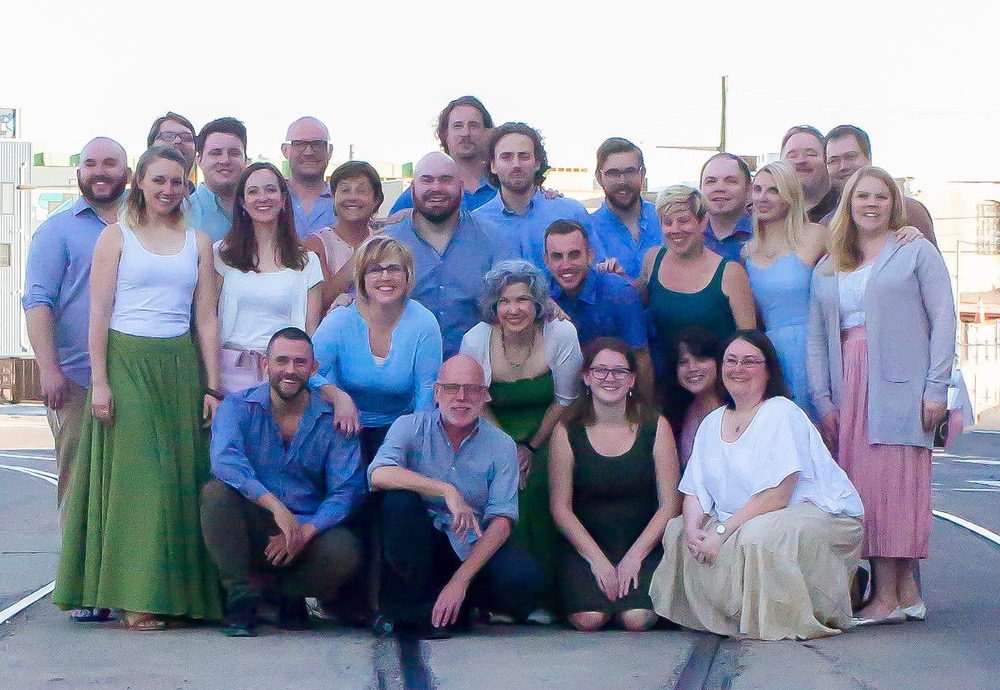The Crossing makes a brilliant stand at Park Avenue Armory

The Crossing performed at the Park Avenue Armory Wednesday night. Photo: Becky Oehlers
New works for chorus aren’t unusual—professional and semi-professional choirs are always looking to expand the repertoire to fill their concerts, and composers can feel confident that their works will actually be performed more than with works for orchestra.
But few choirs have committed themselves to new music so fully, nor become so widely respected in doing so, as the Philadelphia-based chamber choir The Crossing.
The 24-voice ensemble appeared Wednesday night with cellists Alexander Hersh, Arlen Hlusko, and Thomas Mesa as part of the short but impressive recital series presented annually at the Park Avenue Armory.
The Crossing’s program was entitled “Of Arms and the Man,” an homage to the opening of Virgil’s Aeneid, though the precise connection between that half-line of verse and the evening’s selections was unclear—beyond the natural resonance of the Armory and the collection of military portraits that hang in its two beautifully restored reception rooms. In any event, under the direction of Donald Nally, The Crossing performed the entire program brilliantly, showing tight intonation and a powerful yet flexible sound.
Nearly everything performed was a New York premiere, beginning with David Lang’s depart. A thoughtful, if slightly static work for cellos and female voices, it was intended to be played on loop, rather than given live; and so its slow pulses eventually seem to go on for too long, but it is an effective piece nonetheless. Gabriel Jackson’s Our flags are wafting in hope and grief featured delicate overlapping of the voices in a bright tonality that occasionally leans into its dissonances to create exhilarating tension.
In “Conversation in the Mountains” from Where Flames A Word, Kile Smith pushes his dissonances to the edge, lingering on them but ultimately resolving. His harmony-driven writing is lovely to hear, emphasizing the sonic mixture of voices rather than rhythmic movement or intricacy. Louis Andriessen’s Ahania Weeping, the most impressive work on the first half, begins with a soft wail in the solo cello, before growing into a violent, heaving sob for the full choir, all to a gorgeous text by William Blake.
What was likely meant to be the highlight of the first half, Ted Hearne’s Animals, was certainly interesting. An opening cacophony of shrieks and growls gives way to more considered solos or duets, such as a whimpering pup or a pair of coyotes baying at each other, and finally transforms into unison shouts of “these aren’t people, these are animals,” quoting a remark made by Donald Trump earlier this year. The turn from playfulness to fury is an interesting device, but Hearne pushes the point so hard (with extended, frantic repetition and even a little maniacal laughter for punctuation) that it begins to run out of steam.
The second half moved from the Board of Officers Room down the hall to the Veterans Room, and began with Suzanne Giraud’s setting of Pascal Quignard’s Johannisbaum. The text itself offers some peculiar images (“étrange humidité . . . comme sexe se recroqueville sur son museau encore humide,” “strange humidity . . . like sex cowering on his still-wet muzzle”) and the setting itself is odd in its own right, if not especially challenging: repetitive sighing figures in the voices are accompanied by repetitive running figures in the cellos.
The gurgling syncopations of David Shapiro’s Sumptuous Planet seemed a superficial recasting of what is actually a troubling text by Richard Dawkins from Unweaving the Rainbow, a harrowing meditation on the brevity of humans’ understanding of the world.
Gabriel Jackson’s Rigwreck was the most substantial piece on the program, a setting of a poem by Pierre Joris recalling the Deepwater Horizon disaster. Jackson’s tightly wound music sustains gripping tension for the duration of the nearly fifteen-minute piece, alternating between soft wailing and sharp bellowing as it drives constantly forward.
Benjamin C.S. Boyle’s Empire of Crystal was brief compared to its neighbors, but impressed with its shining sonority. Bookending the program, another David Lang work closed the evening: last spring, beginning with a riveting tangle of music for the cellos and giving way to the halting, pointed simplicity of the vocal writing.
In The Crossing’s comparatively brief (ninety-five minutes or so) program, the item that truly stood out from the rest was the Sanctus from Sebastian Currier’s Night Mass. Currier’s simple harmonies develop slowly, each moment richly composed and flowing naturally into the next. There is a deep but quiet sorrow throughout, an interesting twist on what in most musical settings is one of the more jubilant sections of the mass—Currier’s realization even features pensive quotations of the “Dies irae” plainchant, calling to mind one of the darkest parts of the mass. His Sanctus is a fascinating meditation on the troubled relationship between grief and pious devotion, and was perhaps the program’s clearest link back to Virgil, who famously asks “Tantaene animis caelestibus irae?”—“Can heavenly spirits harbor such great anger?”
“Of Arms and the Man” will be repeated at 5 and 7:30 p.m. Thursday at the Park Avenue Armory. armoryonpark.org






